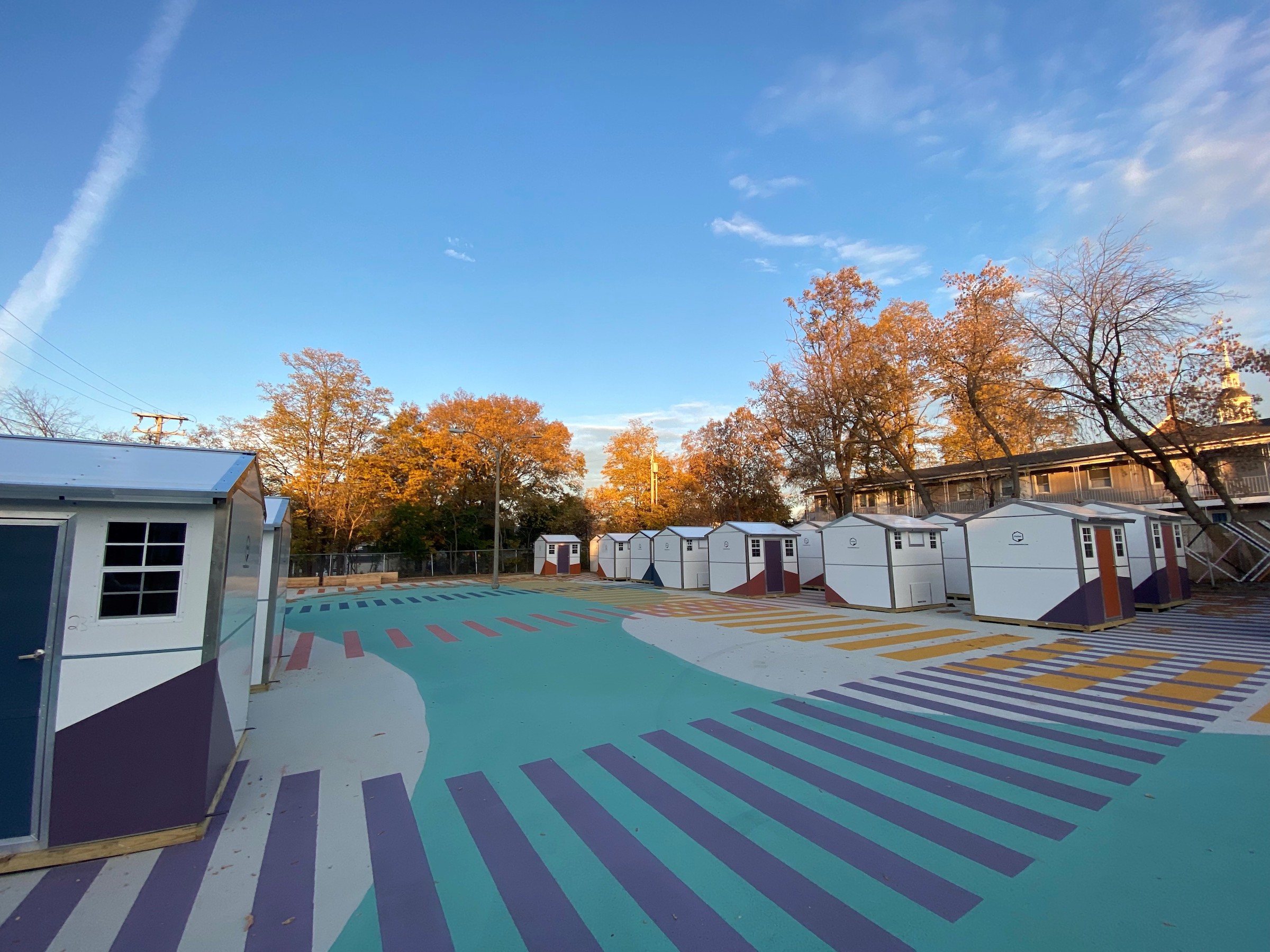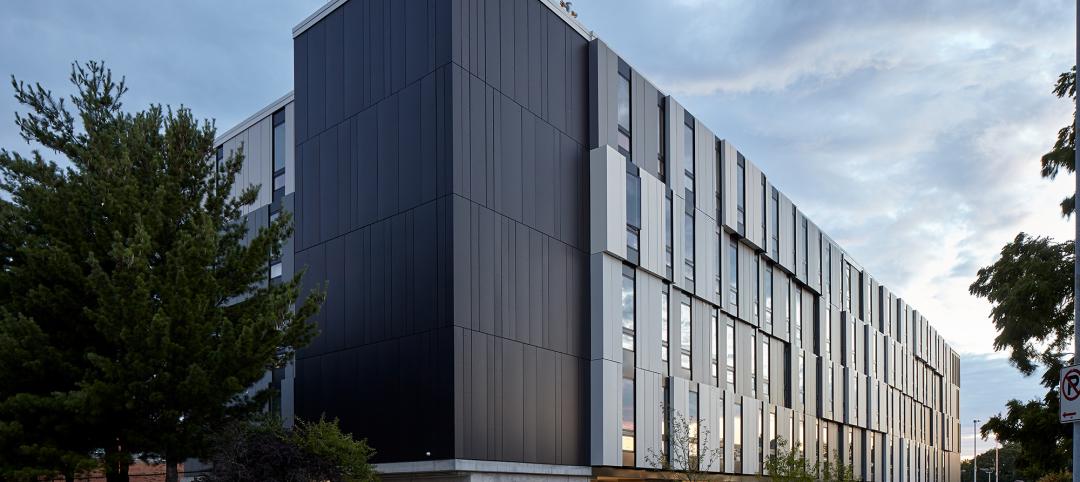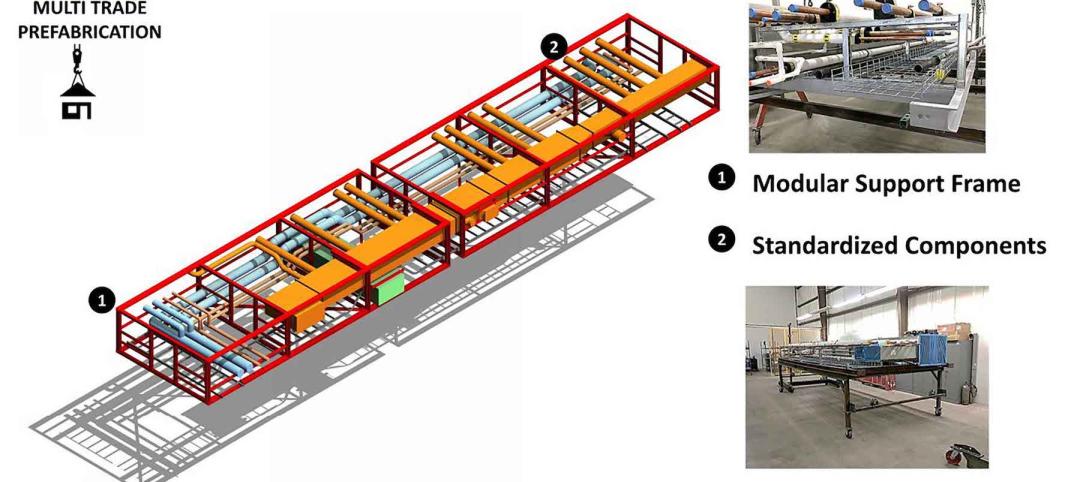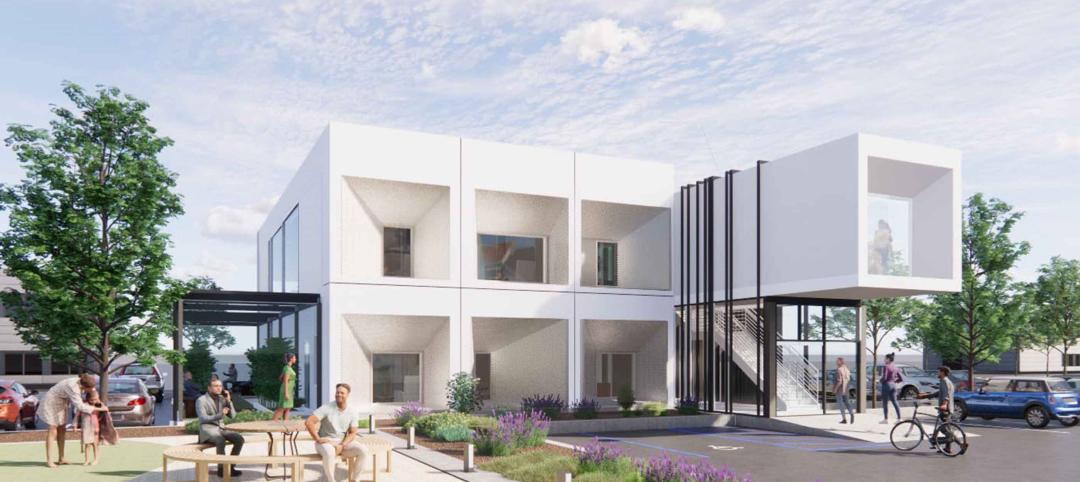More than a half-million Americans are homeless, according to estimates by the World Population Review, which cites the lack of affordable housing among the main causes.
Some advocates for the unhoused contend that this estimate vastly undercounts the actual number. Even in Vermont, with one of the lowest homeless rates in the nation, the problem is escalating. In Burlington, its largest city, the number of homeless went from 261 in 2020 to 700 in 2021, and has stayed elevated, according to the city’s estimates. One in 10 of Burlington’s homeless population is subsisting on the streets.
In December 2021, Burlington’s Mayor Miro Weinberger issued a five-year, 10-point action plan to address his city’s homeless crisis. Among those points was a call to build 30 shelter pods and related infrastructure. Two months later, the city council allocated $1.5 million in American Rescue Plan Act money to pay for the pods, plus additional funding for a community resource center.
In January 2023, Burlington’s Emergency Shelter Community, located on what once was a 0.55-acre municipal parking lot, was preparing to open. The community consists of 25 64-sf shelter pods produced and assembled by Pallet Inc. of Everett, Wash. Five more shelters are provided by a local manufacturer, Up End This, which developed its pods in coordination with the city.
Each “sleeping cabin,” which accommodates one or two people, includes a locking door, fold-up bunk, shelving, lighting, and heating. The shelters provided by Up End This include a desk and chair, and air conditioning. (While it’s not part of the Burlington project, Pallet also makes a 100-sf model that can accommodate up to four unhoused or displaced people.)
Burlington’s shelter village is supported by community spaces supplied by KBS Builders, a Maine-based modular builder. One building contains six full bathrooms, and the other offices, a kitchen, laundry, a gathering/eating area, and space for services. Samantha Dunn, the city’s Community Works Assistant Director, tells BD+C that the two community buildings are designed to meet high-performance energy standards, thanks in part to a donation of a minotaur unit that provides heating, cooling, and ventilation in the bathrooms; and the addition of solar panels provided by Harvestar with funding from the Vermont Low Energy Trust for Electricity. The buildings will be net-energy positive.
The city paid Pallet $11,800 per shelter, which included a cold-weather upgrade, shipping, and assembly services. Pallet’s claim to fame is that it can assemble a shelter in less than one hour.
Pallet Inc.'s modular pods for the homeless
Founded in 2016, Pallet is an offshoot of the green construction company Square Peg Fabrication, also in Everett, and was started by Amy and Brady King. As a Public Benefit Corporation, Pallet uses its profits to expand the impact of its twofold mission: to end homelessness, and to help the homeless find employment with Pallet, which hires people who are engaged in recovery—more than half of its employees have experienced homelessness, substance abuse, or the criminal justice system.
Since its founding, Pallet has delivered 2,800 shelter pods in 16 states and 60-plus cities. In the last week of December 2022, it was scheduled to start its 100th project, a 40-plus-pod village in the state of Washington that Pallet would assemble in two days, says Katya Hill, Pallet’s Director of Marketing and Communication.
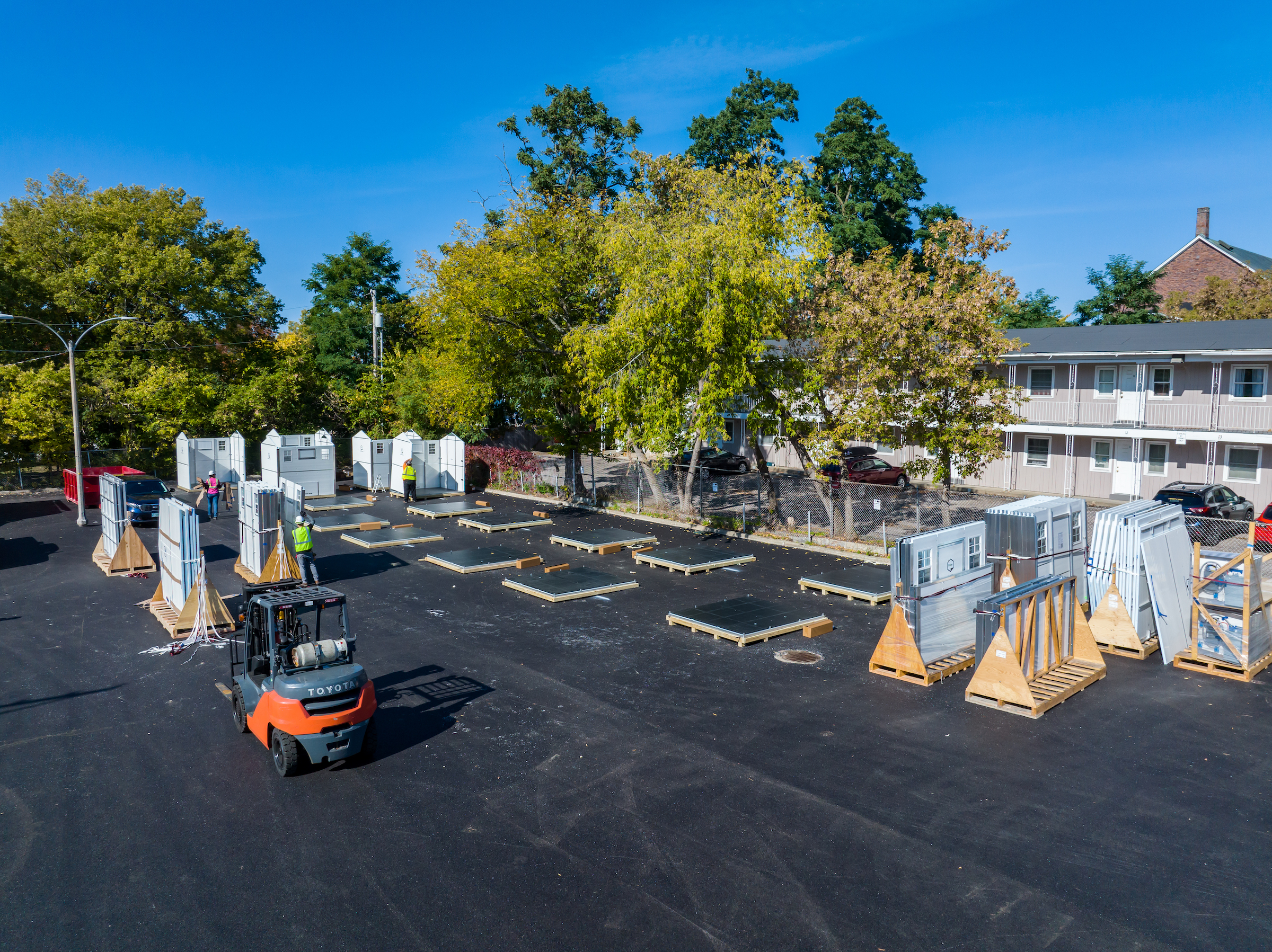
Hill tells BD+C that Pallet views homelessness as more of a social dilemma than a housing shortage problem. She also points out that Pallet is selling shelters, not homes. The shelters, she explains, “are part of a transition, a journey” that ideally leads to some semblance of economic, familial, and mental stability as steps toward permanent housing.
What Burlington is opening, says Dunn, is temporary emergency shelter, which will be operated by a team from Champlain Housing Trust. Per zoning requirements, guests can reside in a shelter for up to 180 days, with the option for a 60-day extension. As part of its action plan to combat homelessness, Burlington has executed memoranda of understanding with the Champlain Valley Office of Economic Opportunity’s CORA team, Turning Point Center of Chittenden County, Community Health Centers of Burlington, and Vermonters for Criminal Justice Reform for onsite services and support. The city continues to work with other nonprofits and faith-based groups to provide basic need items to shelter residents. And it has executed a contract with CVOEO for site-based navigation and service coordination.
Dunn says the city has designed and permitted this site to be in place for three years.
There are always displaced to be sheltered
This year, Pallet—which already enforces what HIll calls “dignity standards” that require its customers to purchase at least five shelters, and provide villages with lighting, security, and social services—will be promoting and pushing its “advisory services” to support the transition from shelters to permanent housing, including food, clothing, transportation, healthcare, and job placement.
Hill acknowledges that Pallet’s mission to end homelessness might sound “grandiose” to some. But she insists that Pallet’s founders would like nothing better than for their company to be put out of business because homelessness became a thing of the past.
That doesn’t mean, however, that the need for shelters would end. Hill points to the millions of people around the world who are displaced by natural disasters, war, and other unexpected events, and who need immediate and safe shelter, as well as medical, food and educational services, until their circumstances are mitigated. Bridging that gap with rapid-response solutions will continue to fuel Pallet’s purpose, says Hill.
Related Stories
Modular Building | Aug 13, 2024
Strategies for attainable housing design with modular construction
Urban, market-rate housing that lower-income workers can actually afford is one of our country’s biggest needs. For multifamily designers, this challenge presents several opportunities for creating housing that workers can afford on their salaries.
Affordable Housing | Aug 7, 2024
The future of affordable housing may be modular, AI-driven, and made of mushrooms
Demolished in 1989, The Phoenix Ironworks Steel Factory left a five-acre hole in West Oakland, Calif. After sitting vacant for nearly three decades, the site will soon become utilized again in the form of 316 affordable housing units.
MFPRO+ New Projects | Jul 31, 2024
Shipping containers converted into attractive, affordable multifamily housing in L.A.
In the Watts neighborhood in Los Angeles, a new affordable multifamily housing project using shipping containers resulted in 24 micro-units for formerly unhoused residents. The containers were acquired from a nearby port and converted into housing units at a factory.
Great Solutions | Jul 23, 2024
41 Great Solutions for architects, engineers, and contractors
AI ChatBots, ambient computing, floating MRIs, low-carbon cement, sunshine on demand, next-generation top-down construction. These and 35 other innovations make up our 2024 Great Solutions Report, which highlights fresh ideas and innovations from leading architecture, engineering, and construction firms.
Contractors | Jun 4, 2024
Contractors expect to spend more time on prefabrication, according to FMI study
Get ready for a surge in prefabrication activity by contractors. FMI, the consulting and investment banking firm, recently polled contractors about how much time they were spending, in craft labor hours, on prefabrication for construction projects. More than 250 contractors participated in the survey, and the average response to that question was 18%. More revealing, however, was the participants’ anticipation that craft hours dedicated to prefab would essentially double, to 34%, within the next five years.
Building Tech | May 21, 2024
In a world first, load-bearing concrete walls built with a 3D printer
A Germany-based construction engineering company says it has constructed the world’s first load-bearing concrete walls built with a 3D printer. Züblin built a new warehouse from a single 3D print for Strabag Baumaschinentechnik International in Stuttgart, Germany using a Putzmeister 3D printer.
Adaptive Reuse | May 15, 2024
Modular adaptive reuse of parking structure grants future flexibility
The shift away from excessive parking requirements aligns with a broader movement, encouraging development of more sustainable and affordable housing.
Healthcare Facilities | Mar 18, 2024
A modular construction solution to the mental healthcare crisis
Maria Ionescu, Senior Medical Planner, Stantec, shares a tested solution for the overburdened emergency department: Modular hub-and-spoke design.
Modular Building | Feb 6, 2024
Modular fire station allows for possible future reconfigurations
A fire station in Southern California leveraged prefab, modular construction for faster completion and future reconfiguration.
Modular Building | Jan 19, 2024
Virginia is first state to adopt ICC/MBI offsite construction standards
Virginia recently became the first state to adopt International Code Council/Modular Building Institute off-site construction standards.


